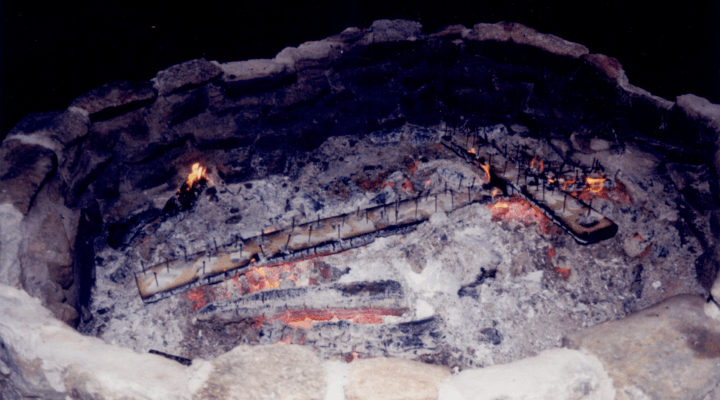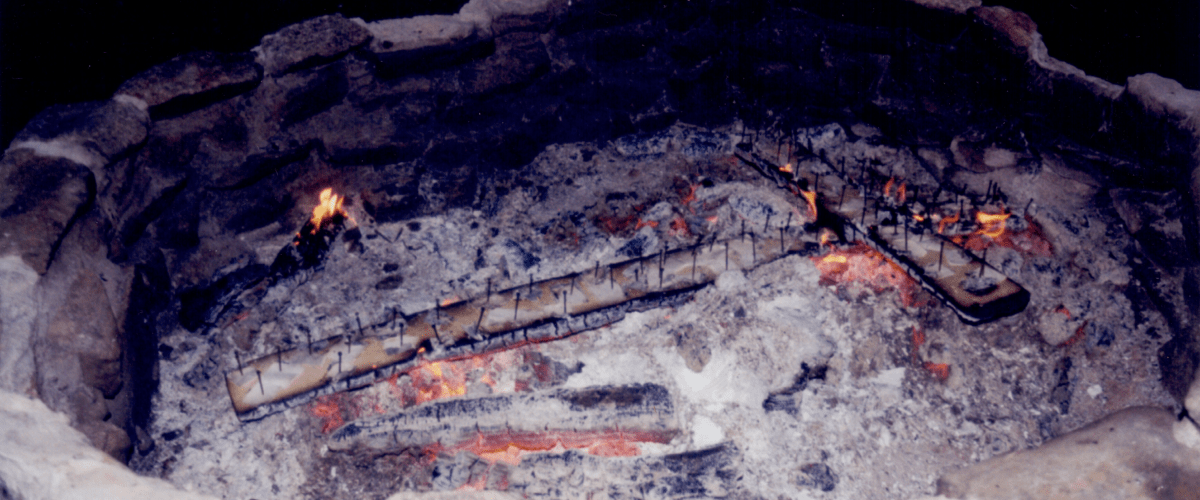I stood next to my friend in the parking lot of our Baptist church with my large suitcase while our moms took our photographs. I was 8 years old. And I was about to experience my first time away from my parents overnight at a week of summer camp.
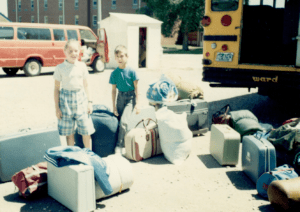
The author prepares to board a church bus for his first trip to summer church camp.
The next five days felt like Neverland. I stayed in a cabin with eight other boys and two college-aged counselors. We rode boats, played large group games, filled our bellies with the most amazing meals, went on hikes and cheered on our teams, while all the anxieties of our 8-year-old worlds seemed like a distant whisper.
By the time I was 18, I had been to Christian camps a total of 17 times. So when it came time to figure out what I would do with my college summers, of course I decided to spend two of them working in a Christian summer camp.
Last summer, my wife and I stood in the hallway of a large state-of-the-art cabin looking down into the eyes of our 9-year-old son. It was the first time we were going to be apart since the day he was born. His voice quietly trembled and his glasses slightly misted as we said our goodbyes. Then we watched as he turned into the room to pick out his bed. We could not have been more excited for him.
With the coronavirus pandemic surging, we made the decision not to send our kids to summer camp this year. But as someone who has invested so much of my life in summer camps, I watched with great interest and concern about how the camps I was familiar with were going to proceed.
Coronavirus and summer camps 2020
According to the American Camp Association, only 6.5 million of the usual 26 million children and teens attended camps this summer, with just 18% of overnight camps operating. The losses for the industry are estimated to be around $16 billion and 900,000 jobs.
While the Federal Reserve decided on July 17 to allow nonprofits to receive financial assistance through the Main Street Lending Program, not every camp can qualify. The financial hit on this already financially tight industry is astounding. Between the financial strain and the mental health benefits from being outdoors, no one would fault camp boards and directors for wanting to do whatever they can to provide a fun camp experience for as many kids as safely possible.
As the summer approached, camps seemed to be moving forward cautiously. One such camp decided to make all their decisions by four principles: trust God, obey authority, value people, and give camp every opportunity to happen.
Ultimately, when the governor in this state allowed overnight camping, this camp moved ahead while following the state’s requirement for each camper to receive a negative COVID-19 test within seven days before arrival at camp and while pledging to follow any other guidelines health officials said were necessary. However, when camp leaders became concerned about the requirement that campers provide a negative COVID-19 test within seven days of arriving at camp, they decided to submit “an alternative suggestion to the governor’s office” and to “send our thoughts as camp professionals to the governor.”
Over the next month and a half, photos and videos were posted online of hundreds of kids each week playing, singing, dancing, and cheering arm in arm with bandanas around their necks but very few pulled up over their faces. The camp said: “There are a few environments where we will (require the bandana to be worn) … . It’s only a few times through the day.” While the staff promised to help with the cleaning, the elementary aged campers were required to clean the cabins and restrooms “as it is part of teaching them responsible living.” And their conservative evangelical parents and youth pastors were ecstatic.
Parents began posting comments online such as, “Giving me the chills! God is great! Yes Lord! To God be the glory!” One parent said, “These kids needed this so badly.” Another mom said, “My son told me this morning at breakfast, ‘Mom, when you are at (camp), you forget all this corona stuff exists!’”
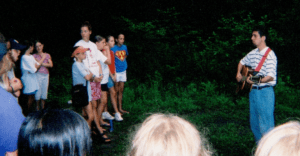
The author leading praise songs at summer camp as a younger man.
My heart began to sink. I know full well the pull of summer camp. And as a stay-at-home dad of five kids, I totally feel the desire to get out. But how can you claim to be taking the pandemic seriously enough, while having 6- to 12-year-old kids cleaning the restrooms and wearing masks so little that they “forget all of this corona stuff exists?”
Soon, COVID-19 began to spread within Christian summer camps, and the ones that chose to open had to begin shutting down. One camp director said to parents: “As the summer wore on, we found it harder and harder to control the environment, even with great policies and protocols in place. Ultimately, we made the decision to shut down because we saw trouble coming, and we no longer felt confident that we could provide a safe environment for your camper and our staff like we promised to do.”
According to a CDC report released last Friday, one camp in north Georgia had 597 campers, with 260 out of the 344 that were tested for coronavirus coming back positive. While the camp reportedly followed all recommended safety procedures, and while all campers and staff had tested negative prior to attending, officials said, “Relatively large cohorts sleeping in the same cabin and engaging in regular singing and cheering likely contributed to transmission.”
“According to the Christian Camp and Conference Association, more than half their 872 member camps decided to stay open this summer — a number hugely out of line with the overall national trend.”
According to the Christian Camp and Conference Association, more than half of their 872 member camps decided to stay open this summer — a number hugely out of line with the overall national trend. Given the health risks, why have so many Christian camps — especially conservative Christian camps — decided to open, when only one out of every five total overnight camps in America opened?
The heart of summer camping
The summer camp experience is about a human connection with self, others and nature. Christian camps see those connections as invitations into a connection with God. The 13th Century mystic St. Francis of Assisi saw all of creation not only as our neighbors, but as family. St. Bonaventure spoke of creation as “the fountain fullness of God’s expressed being.” Summer camps give us a taste of our connection with creation as our family flowing from the fullness of God.
For some more conservative Christian camps, however, there is a more fearful motivation — namely, saving the eternal souls of their campers.
The CCCA works to maximize the ministry of its members “so more people become committed disciples of Jesus Christ” as they trust in Jesus’ “substitutionary atonement for sin” and obey the Bible as “the supreme authority in all matters of faith and conduct.” These priorities lead them to boast of the “tens of thousands” who have been saved and “more than 400,000 adults (who are) now involved in full-time Christian work” as a result of their camps serving 130,000 plus churches.
At one large evangelical Christian camp in Missouri, children who make professions of faith during camp get to ring a big bell, adding enticement to the salvation draw. This is part of the lore of the camp tradition. Other camps allow the kids to celebrate their salvation decision by giving them a microphone on a stage to announce it to the entire camp as a testimony, after which they each receive a standing ovation.
“Summer camps give us a taste of our connection with creation as our family flowing from the fullness of God.”
For evangelical camps, the ultimate priority goes way beyond a connection with self, others, nature and God. Rather, the ultimate motivation is to save the eternal souls of campers from hell.
Running beneath the magic of many conservative Christian summer camps is the theology that God is going to torment the campers in the fires of hell for all eternity if they do not choose to say the sinner’s prayer and trust that God punished Jesus on the cross instead. They brand it publicly as “hearing about Jesus,” which sounds inspiring when said by smiling faces with cool haircuts and trendy clothes, and when set to intimate lighting and fun music.
But make no mistake. These camp leaders literally believe God is going to burn these kids and watch their little bodies writhe in the flames to glorify himself forever. The fairytale dreamland of these summer camps is ultimately for warning kids about the horrifying nightmare of God’s eternal conscious torment. The climax of every conservative Christian summer camp’s year are the hundreds of kids that “get saved.” Even this summer, after listing his camp’s hundreds of salvation decision numbers, one camp director concluded, “So for all the heavy lifting it took to operate in the midst of a global pandemic, it was worth it.”
If God is indeed planning to set everyone on fire forever who doesn’t adhere to conservative Christian theology, then what heavy lifting would we not be willing to do to prevent that? Why would these camps even cancel? Could that fear of hell be a factor in why over half of them decided to open?
What if there were another way?
1 John 4:17-18 says: “God is love. When we take up permanent residence in a life of love, we live in God and God lives in us. This way, love has the run of the house, becomes at home and mature in us, so that we’re free of worry on Judgment Day … . There is no room in love for fear. Well-formed love banishes fear.” Christian summer camps at their best help their campers take up a permanent residence in a life of love by banishing fear.
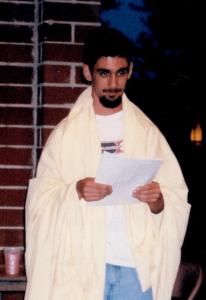
The author in costume portraying a biblical character for a summer camp sketch.
I’m not suggesting we abandon Christianity or summer camps. I’m not trying to characterize these conservative Christian camps as haunted house experiences. They’re actually quite amazing and tend to frame eternal conscious torment as well as one can. I’m simply showing how summer camps during COVID-19 could help us converge in love of self, neighbor and God, while also revealing the inherent contradiction between loving your neighbor and believing in a view of hell that is not the only way to understand God’s eternal plan.
What if we had better news than this? What if Christian summer camps could truly embrace the Franciscan Neverland that they are in and connect kids with “Brother Sun, Sister Moon, Brothers Wind and Air, and Sister Water” to give kids a taste of their Creative Father being “pleased to reconcile to himself all things,” and “making all things new,” until as Julian of Norwich once said, “All shall be well. All manner of things shall be well.”
Rick Pidcock is a stay-at-home father of five kids. He and his wife, Ruth Ellen, have started Provoke Wonder, a collaboration of artists that exists to foster child-like worship through story and song. Provoke Wonder’s first album, Consider the Stars, was released in March 2020. Their first children’s book, What If, will be released in 2020. Rick is pursuing a master of arts degree in worship from Northern Seminary.

